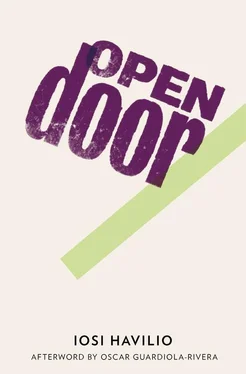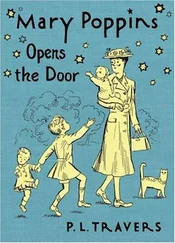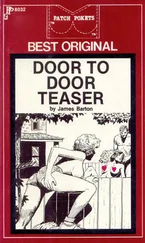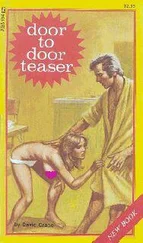Iosi Havilio - Open Door
Здесь есть возможность читать онлайн «Iosi Havilio - Open Door» весь текст электронной книги совершенно бесплатно (целиком полную версию без сокращений). В некоторых случаях можно слушать аудио, скачать через торрент в формате fb2 и присутствует краткое содержание. Год выпуска: 2013, Издательство: And Other Stories, Жанр: Современная проза, на английском языке. Описание произведения, (предисловие) а так же отзывы посетителей доступны на портале библиотеки ЛибКат.
- Название:Open Door
- Автор:
- Издательство:And Other Stories
- Жанр:
- Год:2013
- ISBN:нет данных
- Рейтинг книги:4 / 5. Голосов: 1
-
Избранное:Добавить в избранное
- Отзывы:
-
Ваша оценка:
- 80
- 1
- 2
- 3
- 4
- 5
Open Door: краткое содержание, описание и аннотация
Предлагаем к чтению аннотацию, описание, краткое содержание или предисловие (зависит от того, что написал сам автор книги «Open Door»). Если вы не нашли необходимую информацию о книге — напишите в комментариях, мы постараемся отыскать её.
Iosi Havilio
Open Door
Open Door — читать онлайн бесплатно полную книгу (весь текст) целиком
Ниже представлен текст книги, разбитый по страницам. Система сохранения места последней прочитанной страницы, позволяет с удобством читать онлайн бесплатно книгу «Open Door», без необходимости каждый раз заново искать на чём Вы остановились. Поставьте закладку, и сможете в любой момент перейти на страницу, на которой закончили чтение.
Интервал:
Закладка:
THIRTY
I woke up vomiting. Jaime, being used to Boca who, when he overdoes the wine and meat, goes off somewhere into open country, puts two fingers down his throat and returns it all to the earth, didn’t make a big deal of it. Boca returns and explains, even though he doesn’t need to: I let it all out. And sometimes he adds: I’m good as new, or Nothing to see here. Jaime contains his laughter, pressing his lips together like a teenager. He’s his accomplice. Once they hit fifty, men are either too solitary or together too much, like adolescents. Sometimes self-absorbed and ill-tempered, sometimes extroverted and bloody annoying.
Every other Saturday, Jaime and Boca go hunting in the woods. At around two in the morning, after a long barbecue and lots of preparation, they load their rifles and ammunition into the back of the pick-up and disappear into the night. They hardly ever bring anything back. Sometimes they return straight away, other times dawn breaks and they still haven’t appeared. What do they do? Shoot? Get drunk? Have sex? Without witnesses, anything is possible.
Eloísa appears with Loti, leading him by the hand. She whistles from the gate, she doesn’t want to come in. I don’t feel like going but curiosity, jealousy and boredom impel me. With the gate between us, Eloísa makes the introductions. She says our names and smiles, her lips sparkling. Loti is tall, very slim, with delicate yet virile features. His eyes are such a deep blue that they almost seem fake, and his teeth are small, brown and small. But what makes Loti an unquestionable gypsy are his hands. They need no further description, they’re gypsy hands. Eloísa doesn’t know what to say. She came to show me her Romanian, as hunters show off their catch, proudly. He’s her new toy. Loti watches her, besotted, rather lost, either because he likes her a lot or because he doesn’t understand a word she says.
Aída, or her ghost, appears to me more and more often, at any time of day, under any pretext, usually in the kitchen. She even goes so far as to sit at the table, between Jaime and me, but I stay quiet, I act as if nothing’s happening, so as not to disturb Jaime. I get used to it.
THIRTY-ONE
‘Would you believe me if I said that there are no more than fifty people in Buenos Aires who know of Open Door?’ Domingo Cabred to Jules Huret.
Guido’s birthday party took place in the grocery storeroom, surrounded by bags of flour, packets of espadrilles, tools, bags of coal, bundles of wood, giant aluminium pans, all sorts of tins, toys, piles of gardening gloves and a multitude of dust-coated bottles of aguardiente . The same stuff I’d seen displayed on the shelves of the shop, but in bulk and with that nightmarish quality that things have when they are too many to count.
Eloísa came to get me at ten. I’m going, I said. At the same time, or a couple of seconds later, Jaime opened the tap and put a pan containing the remains of dinner underneath the jet of water just to make noise and not have to hear me. Eloísa had gone into the bedroom without asking permission, as if it belonged to her. I persisted. Jaime, I’m going. He answered with more noise, banging the plates and cutlery he had to hand, playing deaf like an offended child. I felt sorry for him.
Eloísa appeared on tiptoes in one of my dresses. What do you think? she said, extending her arms above her head, full of life. Jaime turned off the tap, looked round and raised his shoulders, nose and eyebrows, biting his tongue to hide his surprise. It was a skin-coloured dress, made of a very fine fabric, semi-transparent, and it definitely looked better on her than it did on me. Jaime opened the tap again and spoke with his back to us.
‘I’m going out too, take your keys,’ he said.
It’s a perfect night, said Eloísa and took out a fat joint that she’d already rolled, which we finished quickly, before we even passed the gate. The rest of the way, neither of us opened our mouths. We were in a hurry, anxious. She wasn’t the same Eloísa as in the early days. More grown up, or sadder, she kept things to herself.
The door of the storeroom was decorated with a garland and a string of flashing Christmas-tree lights that intertwined to form an arch. When we arrived, Guido was busy placing bottles of beer in some buckets of ice. It was early. People will start coming around twelve, he said.
The first to arrive was Armando, a pleasant, funny boy, with more pimples than face. Then the rest started piling in. The party started properly when a group of six girls arrived, among whom was Dani, a little blonde girl with short hair who Eloísa pointed out as Guido’s sort-of-girlfriend. The last to arrive was Moncho, who made us all go outside to admire the motocross bike he’d just been given. It’s the business, said Guido.
At about half one, some people started dancing to keep warm. Guido, Moncho, Eloísa and two other partygoers were having a ‘down in one’ contest, emptying their glasses with that unique speed possessed only by teenagers. Eloísa kept winning, it was obvious that they were letting her. She knew it and she liked it. I felt a bit left out, from another generation. Moncho took me up to dance, and I let myself be taken.
Later, the party extended into the shop itself, using the old wooden counter as a bar. The boys danced in a circle, and every so often one or other of them would step into the middle to play the fool. Eloísa started dancing alone, like a madwoman, attempting a sensual choreography, which to me, looking in from the outside, the effects of the marijuana having worn off, seemed pathetic. Disappointed, or frightened, the other girls, including the little blonde who had barely exchanged a word with Guido, were gradually starting to leave. I went outside as well, for some air. The night, moonless, was a dark cell.
When I returned to the shop, Eloísa was dancing in the middle of a circle of five or six boys, including Guido. When she saw me, she broke the ring, pulling me towards her into the centre of the circle. I resisted slightly and she didn’t insist. Eloísa returned to the bullring. An anonymous push planted Guido face-to-face with his sister, who at the least touch broke into a frenetic dance. Guido decided to pretend he was groping her, without actually touching her, like an aspiring mime artist. Eloísa raised her bum and stuck out her small tits to meet her brother’s indecisive hands. Guido was doing it for his friends, Eloísa for me, like two kids playing for their parents’ approval. Guido’s friends were cheering like degenerates, some giving high-pitched howls, like wolf cubs. One of them suggested: They should kiss. And immediately, the crowd roared its approval. That said it all. I joined the circle and the chorus: Kiss, kiss, kiss, kiss. Since Guido was laughing without doing anything, the group resigned itself to something lesser and the chorus requested a peck instead. Eloísa took the initiative: she shook her brother by the shoulders — by this stage he looked like a scarecrow dazed by the fluttering of a flock of birds — and planted a wet kiss on his incredulous mouth. An animalistic, endless kiss. Guido went white, his friends stopped applauding, their eyes popping out of their heads.
Moncho was the first to react, he stepped forward a few paces, and started dancing behind Eloísa, grabbing her round the waist, and the others, still stupefied, began clapping again.
Between Guido and Moncho, with a movement that would be impossible to reconstruct, so agile, so dreamlike, Eloísa bent down with all the voracity she could muster. Moncho thought he knew what was coming and despite his doubts, he unzipped his trousers. But Eloísa managed the situation perfectly, she knew what she wanted and in another of those magical movements that left everyone feeling rather foolish and open-mouthed, she undressed her brother from the waist down and began caressing him with both hands. Guido squeezed his eyelids shut so as not to see, Moncho groped Eloísa’s tits thinking that he would be next. But no, he would be left hanging, the same as Guido who was so nervous that he couldn’t relax at all. Eloísa looked up at her brother from below, stroking his flaccid cock, and forgave him with a smile full of kindness. She broke the circle, grabbed me by the hand and pulled me into the storeroom to unburden herself.
Читать дальшеИнтервал:
Закладка:
Похожие книги на «Open Door»
Представляем Вашему вниманию похожие книги на «Open Door» списком для выбора. Мы отобрали схожую по названию и смыслу литературу в надежде предоставить читателям больше вариантов отыскать новые, интересные, ещё непрочитанные произведения.
Обсуждение, отзывы о книге «Open Door» и просто собственные мнения читателей. Оставьте ваши комментарии, напишите, что Вы думаете о произведении, его смысле или главных героях. Укажите что конкретно понравилось, а что нет, и почему Вы так считаете.












